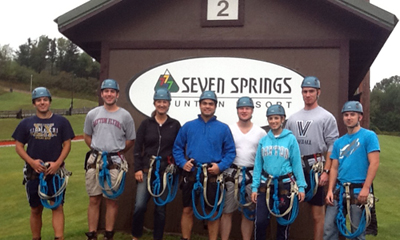Engineering Students Discover Both Benefits and Challenges of Working with Remote Teams

Paul Ruiz, ME ’13, Joseph Bonvissuto (UD), Tracy Miller (UD), Javier Sevilla, ME ’13, Seth Hollingsworth (UD), Krista Korneffel (UD), Matthew Longfield, ME ’13, James Altenburger (UD)
Last fall, the College of Engineering received a three-year $625,000 Kern Entrepreneurship Education Network (KEEN) grant from the Kern Family Foundation. Focused on graduating entrepreneurially-minded engineers, the network established partnerships between universities to address “intrapreneurship” and intercollegiate projects. Together with the University of Dayton, Villanova engineering students are engaged in the network’s intercollegiate initiative. In September 2012, both schools met for the first time to launch their Intercollegiate Student Projects teams.
Students, faculty, and project sponsors traveled to Seven Springs Resort, located 200 miles outside of Pittsburgh, PA where they began establishing collaboration with their University of Dayton counterparts. Focused on teambuilding, one of the key aspects of the KEEN grant, the students participated in an intensive series of challenges, including a zip-lining course surrounding the resort. They also had extensive briefings on their joint projects — “Drop Foot,” sponsored by The McDonnell Foundation, and the “Air Force Research Challenge,” sponsored by Air Force Research Labs. For each project, four University of Dayton students were teamed with four seniors from the College of Engineering.
Students on the Drop Foot project include Electrical and Computer Engineering majors Brendan Kearney, Lester (Jim) McMackin, Jess Swaringen, and Sean Wilson. Mechanical Engineering students Matthew Longfield, David Morgan, Paul Ruiz, and Javier Sevilla were assigned to the Air Force project.
Jess Swaringen, ECE ’13, found the experience at Seven Springs to be particularly helpful because it allowed students to build team chemistry. “It isn't easy to do a collaboration project with a far away university, but getting in some face to face time beforehand definitely helped,” she says. With their project work now underway, Swaringen has seen the benefits of working as a team. “Dayton brings a lot to the table because of their close proximity to a number of research and manufacturing firms which pertain to our project. Our sponsor is located in Philadelphia, so having us here also benefits them,” she explains. Matthew Longfield, ME ’13, spoke to the advantages of combining everyone’s strengths. “Bringing together the creativity and ingenuity of the minds of different scholastic backgrounds provides for a working environment in which ideas seem to be endless.”
While students clearly see the benefits of teamwork, they also acknowledge the challenges of working with a remote team. “The difficulty lies in finding a time in which we can all actually meet together. We are in constant email contact, trying to find at least an hour a week that we can squeeze into all of our individual schedules to meet as a complete team,” explains Longfield.
College faculty accompanying the students to Seven Springs included George Simmons, Director of the Villanova Multidisciplinary Design Laboratory; Dr. Jim Klingler, Assistant Professor, Management & Operations, Villanova School of Business; Dr. Young Chun, Associate Professor, Mechanical Engineering, and advisor on the Drop Foot project; and Bill Koffke, Assistant Professor, Mechanical Engineering, and advisor on the Air Force Challenge project. Principal investigators for the KEEN grant are Edmond J. Dougherty EE ’69, MSCS ‘86, director of the program; Dr. Gary Gabriele, Drosdick Endowed Dean of Engineering; and Dr. Pritpal Singh, Professor and Chair of Electrical and Computer Engineering.
When asked about the objective of the KEEN Intercollegiate Student Projects program, director Ed Dougherty stated simply, “The goal is to provide engineering students the experience of working on a real world project with remote team members.” Swaringen added, “Nowadays many companies in industry are collaborating with other firms from around the world, so it will be good to have a little experience with it.”
Refer to this related article for more information about this award to Villanova’s Engineering Entrepreneurship Program and the individual student projects.
